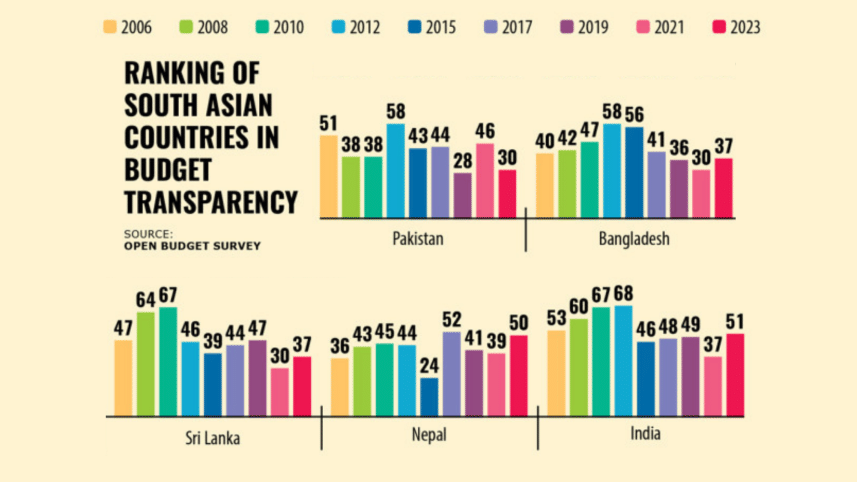Bangladesh continues to perform poorly in budget transparency

Bangladesh has continued to showcase a weak performance in the open budget rankings among its South Asian peers, reflecting a lack of transparency and accountability in the formulation and implementation of fiscal measures.
The nation's budget, traditionally unveiled in the first week of June every year, suffers from very poor public participation at different stages of its formulation and weak oversight by the legislature and supreme audit institution on planning and spending.
The government also does not publish materials to support informed public debate on the budget, which ensures that taxpayers' money is spent on greater welfare and interest, according to the Open Budget Survey (OBS) conducted by non-profit organisation International Budget Partnership (IBP).
Bangladesh ranked 37th in the transparency rankings among 125 countries in 2023—just above Pakistan and on a par with Sri Lanka in South Asia—in the latest OBS.
Transparency, which assesses online availability, timeliness, and comprehensiveness, is measured on a scale of 0 to 100. A transparency score of 61 or above indicates that a country is likely publishing enough material to support informed public debate on the budget.
Bangladesh's score is below the global average score of 45, said Mohammad Abu Eusuf, a professor of development studies and director at the Centre on Budget and Policy at the University of Dhaka.
"Taxpayers have the right to know how public money is spent. Tracking the budget processing and spending is important to ensure value for money for taxpayers," he said.
Transparency starts with the preparatory phases of the budget.
Publishing the pre-budget statement that outlines the broad parameters of fiscal policies, an economic forecast, anticipated revenue, expenditures, and debt levels is an important part of budget transparency.
In Bangladesh, a pre-budget statement is not published. In many other countries, pre-budget statements are published to encourage discussion among people on budgetary measures.
"In our country, we see a lot of discussion before the formulation of the budget. But we remain in the dark about how much of the recommendations from the consultations are included in the budget," he said.
"Surprisingly, the proposed budget is printed in a large volume, and we see almost no qualitative change in the enacted budget. This practice turns the discussion on the proposed budget in parliament by spending public money futile," said Eusuf.
"Ultimately, the enacted budget becomes a rubber stamp for the initially proposed ones," he said.
As per international practice, the monthly report on budget implementation is published online, and this should be published within three months of the reporting quarter.
Bangladesh publishes a monthly fiscal report, but it is not made available within three months. However, there has been some improvement.
The Public Finance and Budget Management Act 2009 makes it compulsory to present quarterly budget implementation reports. The finance ministry releases the report, but the lag period is large.
A simplified version of the budget is published in many countries so that ordinary citizens can understand the fiscal measures. This is not done here.
An audit report on the implementation of the budget is also supposed to be published within 18 months of the year-end to inform citizens. Here, this is not yet done, he said.
"This is needed to ensure transparency and accountability. As a taxpayer, you have the right to know how your money is spent," said Eusuf.
The IBP said government budget decisions—which taxes to levy, which services to provide, and how much debt to take on—have important consequences for all people in society.
"When governments provide information and meaningful channels for the public to engage in these decisions, we can better ensure public money is spent on public interests," it said.
Eusuf said various countries ensure education and healthcare and provide elderly care and unemployment allowance for their citizens through tax money.
"We have no health cards in our country. None would come to Dhaka had there been large hospitals with adequate facilities in divisions," he said, adding that such facilities would have made taxpayers feel more interested in paying taxes.
There are issues of corruption and a lack of accountability among public officials. "You see vehicles plying on the road even though those do not have fitness clearance," he said.
Taxpayers also feel discouraged when they see overestimations of project expenditures, he said.
Towfiqul Islam Khan, senior research fellow at the Centre for Policy Dialogue, said the finance ministry needs to prioritise the need for establishing transparency and accountability.
"In recent years, reporting to the parliament under the public money act was also very weak and ornamental. In absence of the parliament, the interim government must uphold the spirit of consultation and prepare to engage with stakeholders," he said.




 For all latest news, follow The Daily Star's Google News channel.
For all latest news, follow The Daily Star's Google News channel.
Comments